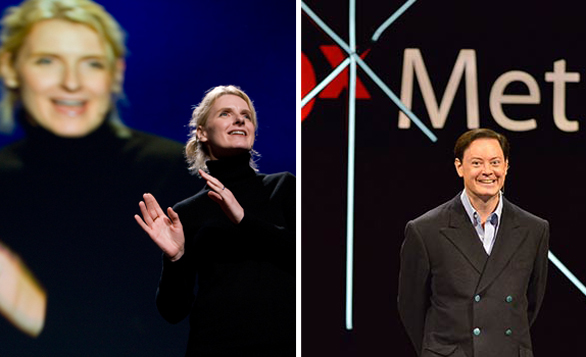With just one week left to go until TED2014, our speakers are putting the final touches on their talks. But that’s hardly all they’ve been up to. This week, check out which speaker has a bold prediction about artificial intelligence, which one put out a call for a more creative condom design, which one wrote about the science of goat arousal and which launched a defense of Justin Bieber.
Futurist Ray Kurzweil has made a striking new prediction: 2029 is the year computers will surpass human intelligence. At that point, they’ll be able to make jokes, learn from experience and even flirt, he says.
Last week, astronaut Chris Hadfield discussed the world-class hardware that is giving Canada the edge in the space race. Hadfield also recently defended teen pop star Justin Bieber, who he thinks has been a victim of aggressive media coverage.
Investment expert Mellody Hobson and her husband, filmmaker George Lucas of Star Wars fame, are donating $25 million to the University of Chicago Lab Schools to construct an arts building. Hobson is a longtime supporter of education in Chicago.
First Microsoft, now… e-condoms? The Bill & Melinda Gates Foundation recently put out a call to design a better condom. The designs they got back were certainly creative.
The latest “What If?” from cartoonist Randall Munroe asks: “Has humanity produced enough paint to cover all the land on Planet Earth?”
Andrew Solomon takes a fresh look at the impact of culture on mental health in this essay for Esquire, sharing his experience with a Senegalese ritual to treat depression. Solomon also wrote an article for The New Yorker this week about Peter Lanza, the father of the Sandy Hook shooter.
Speaking of Solomon, he and Elizabeth Gilbert have both been nominated for the Wellcome Prize, an annual book award for works that explore medical themes. Gilbert’s latest book, The Signature of All Things, and Solomon’s Far From the Tree are two of the six nominated books. Another TEDster, Oliver Sacks, was also nominated.

TED2014 speakers Elizabeth Gilbert and Andrew Solomon have both been nominated for the Wellcome Prize for their books.
Before heading to Vancouver, magician and illusionist Marco Tempest stopped by South by Southwest, the annual music, film and technology conference in Austin, Texas. At the conference, Tempest discussed the future of wearable tech.
The Bill & Melinda Gates Foundation just published the third edition of “Primary Sources,” its study that surveys teacher satisfaction. The survey looked at professional support and educational technology, and found that teachers wished they had more of a platform for their voices to be heard.
Though TED Fellow and film director Jehane Noujaim’s documentary The Square did not win the Oscar for best documentary at the Academy Awards last weekend, the nomination made Noujaim the first Egyptian to be nominated by the Academy. With The Daily Beast, Noujaim discussed the challenges and rewards of creating her political documentary.
Ben Saunders’ recent arctic trek set the record for the longest polar journey on foot, and WIRED took an in-depth look at Saunders’ expedition. The adventurer also discussed his recent trip in an interview with The Telegraph.
Sting sat down with The Chicago Tribune to discuss his new musical, The Last Ship, while he was in town for a concert. The rock star is on a month-long co-headlined tour of the US and Canada with Paul Simon.
Writer Jon Mooallem published an article in last week’s New York Times Magazine about Jacques-André Istel, mayor and founder of a small California town best known as the official center of the world.
And this week, science writer Ed Yong published quite a few fascinating stories. In The Scientist, he describes two studies that made important breakthroughs on plant genomics. For Nature, he examines new drone behavior that enables a fleet of aircrafts to fly in a pattern without central control. And in National Geographic, he discusses new research on “eau de goat,” or the pheromones involved in female goat arousal.
Comments (4)
Pingback: Oliver Sacks Ted Talk VideoClip4U
Pingback: Futureseek Daily Link Review; 12 March 2014 | Futureseek Link Digest